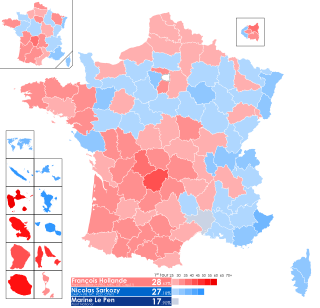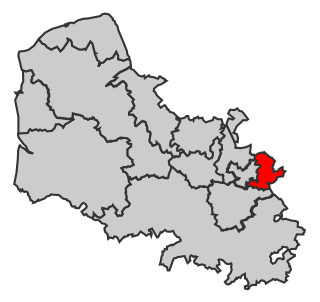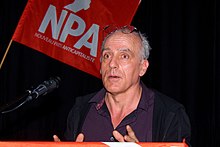The Revolutionary Communist League was a Trotskyist political party in France. It was the French section of the Fourth International (Post-Reunification). It published the weekly newspaper Rouge and the journal Critique communiste. Established in 1974, it became the leading party of the far-left in the 2000s. It officially abolished itself on 5 February 2009 to merge with smaller factions of the far-left and form a New Anticapitalist Party.

Alain Krivine was a French Trotskyist leader.
French presidential debates, broadcast on TV, traditionally occurred only between the two rounds of the presidential elections.
In 2017, for the first time, a presidential debate took place prior to the first round.

The New Anticapitalist Party is a far-left political party in France founded in February 2009. The party launched with 9,200 members and was intended to unify the fractured movements of the French radical Left, and attract new activists drawing on the combined strength of far-left parties in the 2002 presidential elections, where they achieved 10.44% of the vote and 7% in 2007.

Olivier Christophe Besancenot is a French left-wing political figure and trade unionist, and the founding main spokesperson of the New Anticapitalist Party from 2009 to 2011.

Jean-Luc Mélenchon is a French politician who was a member of the National Assembly for Bouches-du-Rhône's 4th constituency from 2017 to 2022. He led the La France Insoumise group in the National Assembly from 2017 to 2021. Mélenchon was elected as a member of the European Parliament (MEP) in 2009 and reelected in 2014. He has run for president of France three times. In 2022, he came within 1.2 percentage points of reaching the second round in France's two-round voting system.

Presidential elections were held in France on 22 April 2012, with a second round run-off held on 6 May to elect the President of France. The incumbent Nicolas Sarkozy was running for a second five-year term for which he was eligible for under the Constitution of France.

The Left Front was a French electoral alliance and a political movement created for the 2009 European elections by the French Communist Party and the Left Party when a left-wing minority faction decided to leave the Socialist Party, and the Unitary Left, a group which left the New Anticapitalist Party. The alliance was subsequently extended for the 2010 regional elections and the 2012 presidential election and the subsequent parliamentary election.

The 11th constituency of the Pas-de-Calais is a French legislative constituency in the Pas-de-Calais département. It elects one député to the National Assembly. It has been represented by Marine Le Pen since 2017.

Presidential elections were held in France on 23 April and 7 May 2017. As no candidate won a majority in the first round, a runoff was held between the top two candidates, Emmanuel Macron of En Marche! (EM) and Marine Le Pen of the National Front (FN), which Macron won with a difference of more than 30% of the vote. The presidential election was followed by a legislative election to elect members of the National Assembly on 11 and 18 June. Incumbent president François Hollande of the Socialist Party (PS) was eligible to run for a second term, but declared on 1 December 2016 that he would not seek reelection in light of low approval ratings, making him the first incumbent head of state of the Fifth Republic not to seek reelection.

Nathalie Yvonne Thérèse Arthaud is a French secondary school (lycée) economics teacher and politician. Since 2008, she has served as the spokesperson for the Lutte Ouvrière, a communist party, and has stood for election under the party multiple times, beginning in 2001.
Anticapitalist Left was a French organisation (2011–2015), member of the Left Front from 2012 to its dissolution in 2015.
This page lists public opinion polls conducted for the 2022 French presidential election the first round of which was held on 10 April 2022. Since no candidate won a majority of the vote in the first round, the second round election was held between the top two candidates on 24 April 2022.

Legislative elections were held in France on 11 and 18 June 2017 to elect the 577 members of the 15th National Assembly of the Fifth Republic. They followed the two-round presidential election won by Emmanuel Macron. The centrist party he founded in 2016, La République En Marche! (LREM), led an alliance with the centrist Democratic Movement (MoDem); together, the two parties won 350 of the 577 seats—a substantial majority—in the National Assembly, including an outright majority of 308 seats for LREM. The Socialist Party (PS) was reduced to 30 seats and the Republicans (LR) reduced to 112 seats, and both parties' allies also suffered from a marked drop in support; these were the lowest-ever scores for the centre-left and centre-right in the legislative elections. The movement founded by Jean-Luc Mélenchon, la France Insoumise (FI), secured 17 seats, enough for a group in the National Assembly. Among other major parties, the French Communist Party (PCF) secured ten and the National Front (FN) obtained eight seats. Both rounds of the legislative election were marked by record low turnout.

The French Socialist Party held a two-round presidential primary to select a candidate for the 2017 presidential election on 22 and 29 January 2017. It was the second open primary held by the center-left coalition, after the primary in 2011 in which François Hollande defeated Martine Aubry to become the Socialist nominee. Hollande went on to defeat incumbent Nicolas Sarkozy in the 2012 presidential election. However, because of his low approval rating, he announced that he would not seek re-election, becoming the first president of the Fifth Republic to decide not to run for a second term. The primary was contested by seven candidates, four from the Socialist Party and three representing other parties part of the left-wing electoral alliance.

La France Insoumise is a left-wing political party in France. It was launched in 2016 by Jean-Luc Mélenchon, then a Member of the European Parliament (MEP) and former co-president of the Left Party (PG). It aims to implement the eco-socialist and democratic socialist programme L'Avenir en commun. The party utilises the lower case Greek letter phi as its logotype.

Presidential elections were held in France on 10 and 24 April 2022. As no candidate won a majority in the first round, a runoff was held, in which Emmanuel Macron defeated Marine Le Pen and was re-elected as President of France. Macron, from La République En Marche! (LREM), had defeated Le Pen, leader of the National Rally, once already in the 2017 French presidential election, for the term which expired on 13 May 2022. Macron became the first president of France to win a re-election bid since Jacques Chirac won in 2002.

Legislative elections were held in France on 12 and 19 June 2022 to elect the 577 members of the 16th National Assembly of the Fifth Republic. The elections took place following the 2022 French presidential election, which was held in April 2022. They have been described as the most indecisive legislative elections since the establishment of the five-year presidential term in 2000 and subsequent change of the electoral calendar in 2002. The governing Ensemble coalition remained the largest bloc in the National Assembly but substantially lost its ruling majority, resulting in the formation of France's first minority government since 1993; for the first time since 1997, the incumbent president of France did not have an absolute majority in Parliament. As no alliance won a majority, it resulted in a hung parliament for the first time since 1988.

The New Ecological and Social People's Union was a left-wing electoral alliance of political parties in France. Formed on May Day 2022, the alliance included La France Insoumise (LFI), the Socialist Party (PS), the French Communist Party (PCF), The Ecologists (LE), Ensemble! (E!), and Génération.s (G.s), and their respective smaller partners. It was the first wide left-wing political alliance since the Plural Left in the 1997 French legislative election. Over 70 dissident candidates who refused the accord still ran.

Legislative elections were held in France on 30 June and 7 July 2024 to elect all 577 members of the 17th National Assembly of the Fifth French Republic. The election followed the dissolution of the National Assembly by President Emmanuel Macron, triggering a snap election after the National Rally (RN) made substantial gains and Macron's Besoin d'Europe electoral list lost a significant number of seats in the 2024 European Parliament election in France.


















